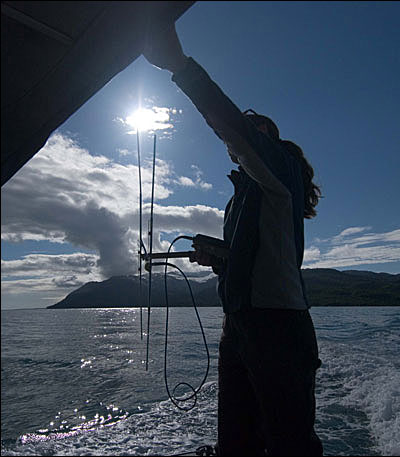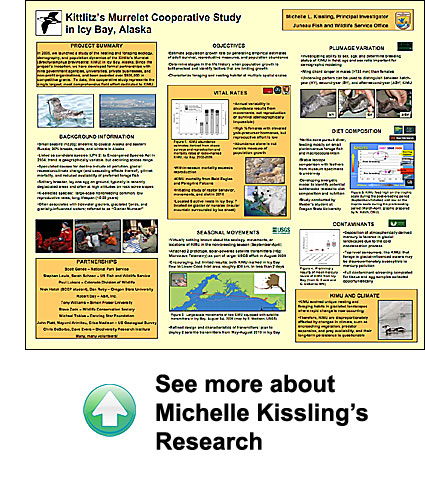Alaska: Benefits of Partnerships
 Endemic to coastal Alaska and eastern Russia, the Kittlitz’s Murrelet (Brachyramphus brevirostris) is one of the rarest seabirds in the world. The majority (roughly 90%) of the global population breeds, molts, and winters in Alaska. During the breeding season, this species often associates with tidewater glaciers, and glaciated fjords and streams. Kittlitz’s Murrelets have low reproductive rates: they are non-colonial, likely delay breeding until three years of age, and lay a single egg, typically in recently deglaciated areas and often at high altitudes on rock scree slopes. The winter range of the Kittlitz’s Murrelet is not well known, but based on opportunistic sightings, is likely pelagic.
Endemic to coastal Alaska and eastern Russia, the Kittlitz’s Murrelet (Brachyramphus brevirostris) is one of the rarest seabirds in the world. The majority (roughly 90%) of the global population breeds, molts, and winters in Alaska. During the breeding season, this species often associates with tidewater glaciers, and glaciated fjords and streams. Kittlitz’s Murrelets have low reproductive rates: they are non-colonial, likely delay breeding until three years of age, and lay a single egg, typically in recently deglaciated areas and often at high altitudes on rock scree slopes. The winter range of the Kittlitz’s Murrelet is not well known, but based on opportunistic sightings, is likely pelagic.
The current Alaska population is estimated to be approximately 16,000 birds (nearly half occur in southeast Alaska). This represents a dramatic decline over the past 30 years with declines of up to 18% per year in some core areas. Speculated causes for decline include oil pollution, glacial recession (and cascading effects thereof), gill-net mortality, and reduced availability of preferred forage fish. The fate of the Kittlitz’s Murrelet is likely linked to changes in climate; extirpation in some key populations is predicated as early as 2030.
Benefits of Partnerships
Partner agencies and institutions, and in particular, the National Park Service, have prioritized this collaborative effort to help conserve the Kittlitz’s Murrelet. To date, over $500,000 has been awarded from competitive grants to this effort, including funding for efforts to continue through 2012. The grants have and will support data collection, laboratory analyses, seasonal employee salaries and travel, and one graduate student assistantship.
 Additionally, all partners provide in-kind contributions and base funding to cover salaries, travel, vessel time, and some field equipment. By collaborating with a diversity of partners, the plight of the Kittlitz’s Murrelet has permeated different audiences throughout the world. Using public and scientific presentations, websites, and magazine and newspaper articles, we are successfully raising both public and agency awareness about this declining species.
Additionally, all partners provide in-kind contributions and base funding to cover salaries, travel, vessel time, and some field equipment. By collaborating with a diversity of partners, the plight of the Kittlitz’s Murrelet has permeated different audiences throughout the world. Using public and scientific presentations, websites, and magazine and newspaper articles, we are successfully raising both public and agency awareness about this declining species.
For More Information
Michelle L. Kissling
U.S. Fish and Wildlife Service
3000 Vintage Blvd., Suite 201
Juneau, AK 99801
(907) 780-1160
Visit the Alaska Region website for the
U.S. Fish & Wildlife Service, and learn more.
